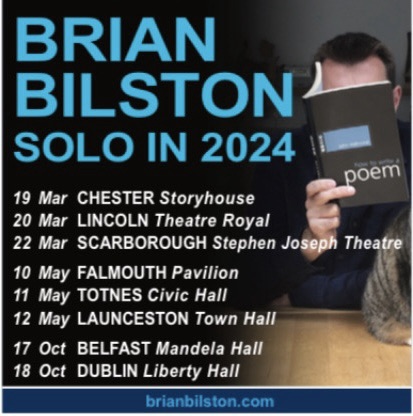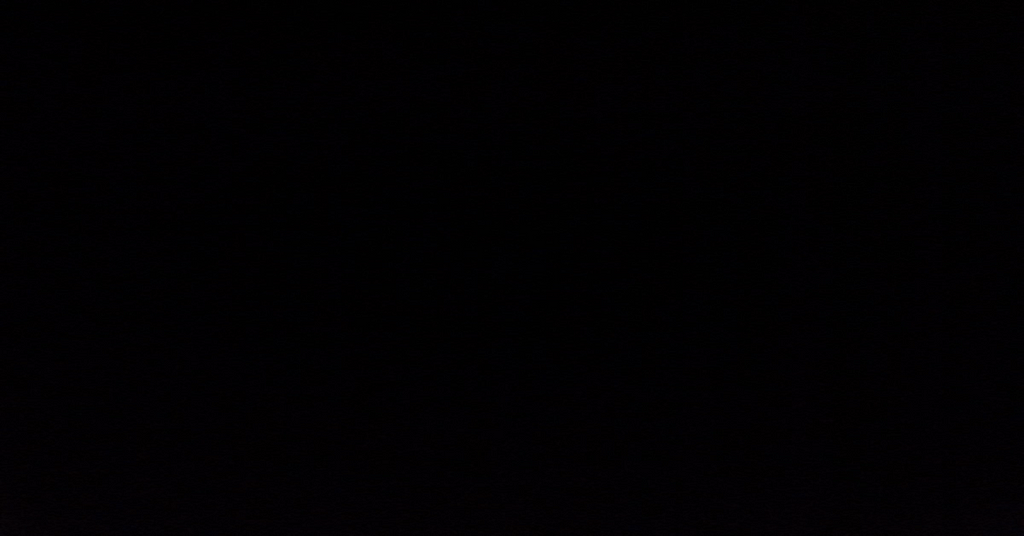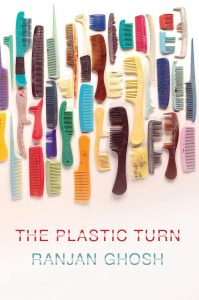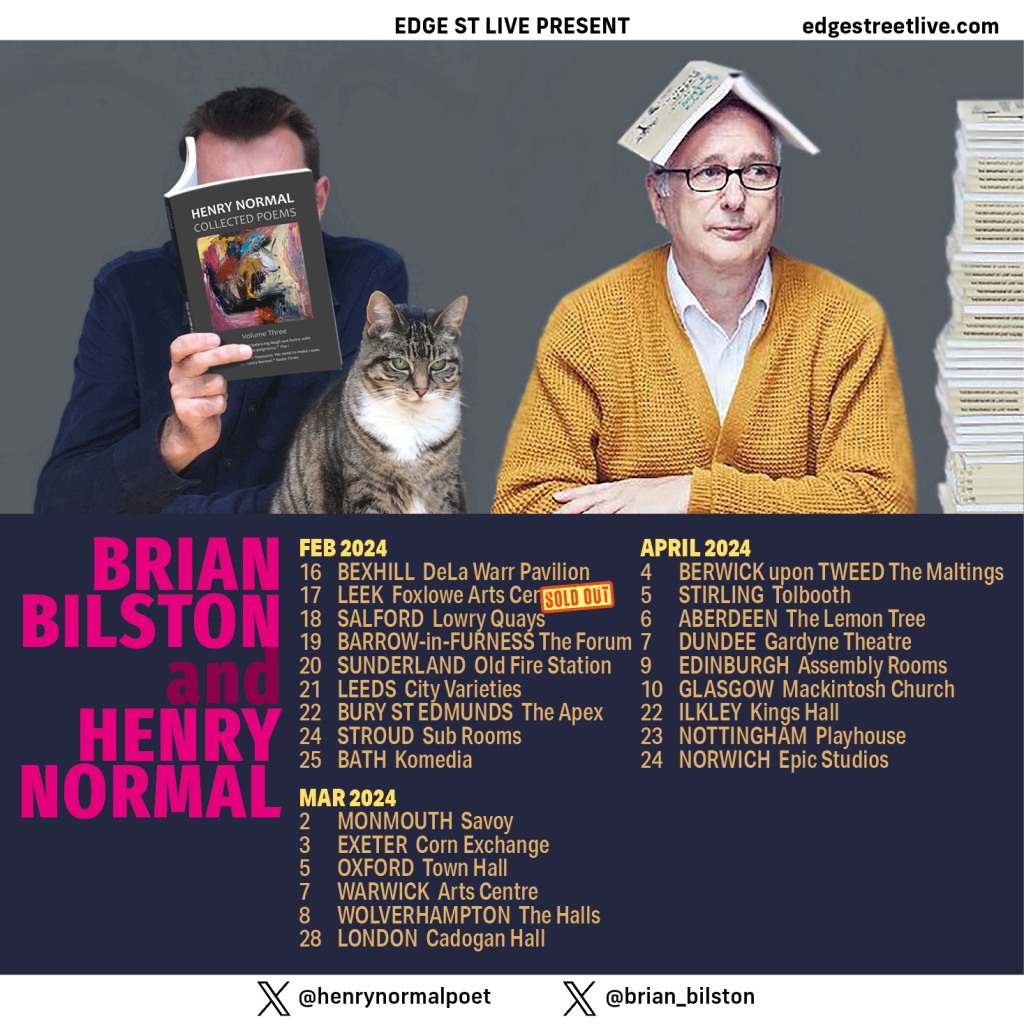poetry
2024 Shows (warning: may contain poetry)
Well done, everybody, for making it to January 569th.
I’ve been grateful for those extra days this month, as it’s given me time to get my head together for my 2024 shows, which begin in just over two weeks’ time with a run of dates with the fabulous poet (and human) Henry Normal. We start on 16th February in Bexhill-on-Sea on the south coast.
 Places and dates
Places and dates
Shows in Nottingham and Monmouth have now sold out – alongside Salford, Leeds, Exeter, Bath, Stroud and Leek.
There are only a handful of tickets remaining for London, Oxford, Bury St Edmunds, Coventry and Ilkley.
Tickets are also on sale for Sunderland, Barrow, Wolverhampton, Norwich, Berwick-upon-Tweed, Stirling, Aberdeen, Dundee, Edinburgh, Glasgow, plus two new shows announced last week: Bristol and Southampton.
And a small reminder that I’m doing a few solo shows this year in fancy coming along to one: Chester, Lincoln, Scarborough, Falmouth, Totnes, Launceston, Belfast and Dublin.
 More places and dates
More places and dates
If you came to see me last year and for some strange reason are considering coming along again, then you might be reassured to know I’ll be reading a bunch of new poems (alongside a few older ones). There’s a guarantee of a least two new jokes or your money back (terms and conditions apply*).
Links to more information and tickets can be found on this page: 2024 shows and ticket info
* Brian Bilston reserves the right to define what constitutes a joke. A joke may not always be dependent on laughter.
Strange Groceries

Listen to a reading by Tim Foley:
https://medium.com/media/d013ea615f215fdea1d420b0a35880f2/href
What strange groceries that man is carrying
Odd shapes in two plastic bags
Dripping blood
They look like they weigh more than the world
Head bowed
Eyes screwed shut
Step after step, feet like lead
Allah, Allah, Allah, Allah
What are those strange groceries you carry, sir?
These are my children, he says through a clenched jaw
They have had a long and weary day
And it is time to put them to bed
His face is wet with tears
And his arms are shaking
He walks on
Heavy feet with a heavy burden
Allah, Allah, Allah, Allah
Oh Allah
____________
____________
____________
My work is entirely reader-supported, so if you enjoyed this piece here are some options where you can toss some money into my tip jar if you want to. Go here to buy paperback editions of my writings from month to month. All my work is free to bootleg and use in any way, shape or form; republish it, translate it, use it on merchandise; whatever you want. The best way to make sure you see the stuff I publish is to subscribe to the mailing list on Substack, which will get you an email notification for everything I publish. All works co-authored with my husband Tim Foley.

Bitcoin donations: 1Ac7PCQXoQoLA9Sh8fhAgiU3PHA2EX5Zm2
Global Language Justice – review
In Global Language Justice, Lydia H. Liu and Anupama Rao bring together contributions at the intersection of language, justice and technology, exploring topics including ecolinguistics, colonial legacies and the threat digitisation poses to marginalised languages. Featuring multilingual poetry and theoretically rich essays, the collection provides fresh humanities perspectives on the value of preserving linguistic diversity, writes Andrew Shorten.
Global Language Justice. Lydia H. Liu and Anupama Rao (Eds.)with Charlotte A. Silverman. Columbia University Press. 2023.
 Recently, scholars have been paying closer attention to the relationships between language and justice, leading to two separate but related strands of academic research. On one side, applied linguists are increasingly preoccupied with issues connected to social justice, race and gender. An example of this is Ingrid Pillar’s influential book Linguistic Diversity and Social Justice (Oxford, 2016), which explores how language hierarchies, ideologies and expectations affect people’s access to meaningful work and social participation. On the other side, political theorists are incorporating language into discussions about democracy and distributive justice, exploring how political communities should handle multilingualism and questioning whether people have justice-related claims or duties tied to the languages they use. A well-known example of this is Philippe Van Parijs’s book Linguistic Justice for Europe and the World (Oxford, 2011), which provocatively argues that native English speakers have a duty to compensate non-native English speakers since the latter group’s efforts contribute to a tremendously beneficial public good.
Recently, scholars have been paying closer attention to the relationships between language and justice, leading to two separate but related strands of academic research. On one side, applied linguists are increasingly preoccupied with issues connected to social justice, race and gender. An example of this is Ingrid Pillar’s influential book Linguistic Diversity and Social Justice (Oxford, 2016), which explores how language hierarchies, ideologies and expectations affect people’s access to meaningful work and social participation. On the other side, political theorists are incorporating language into discussions about democracy and distributive justice, exploring how political communities should handle multilingualism and questioning whether people have justice-related claims or duties tied to the languages they use. A well-known example of this is Philippe Van Parijs’s book Linguistic Justice for Europe and the World (Oxford, 2011), which provocatively argues that native English speakers have a duty to compensate non-native English speakers since the latter group’s efforts contribute to a tremendously beneficial public good.
Political theorists are incorporating language into discussions about democracy and distributive justice, exploring how political communities should handle multilingualism
Bringing together linguists with scholars from across the humanities, Global Language Justice throws new light on these and other, related, topics. Emphasising the relationships between language, environment and technology, and featuring both poetry and academic essays, this edited collection brings a fresh perspective on the emerging “ecolinguistics” research agenda, which explores the entanglements amongst struggles to protect biological, linguistic and cultural diversity. The book succeeds in bringing new issues to the fore, especially regarding the challenges of digitisation for language justice and the connections between coloniality and language justice. Another laudable feature of this book is that, far more than is typical for an edited collection of this type, it has the feel of a genuinely collaborative project, with frequent cross-referencing across the different chapters, most of which were first presented at a Mellon Foundation Sawyer Seminar, hosted by Columbia University.
The book succeeds in bringing new issues to the fore, especially regarding the challenges of digitisation for language justice and the connections between coloniality and language justice.
Many of the chapters centre the predicament of Indigenous languages and the experiences of Indigenous language activists. This marks a contrast with both strands of research mentioned earlier, which tend to focus on the claims of sub-state national minorities and, to a lesser extent, immigrants. Careful engagement with Indigenous scholars, activists and communities should prompt a reconsideration of some dominant linguistic and political categories. For instance, Wesley Leonard’s insightful contribution demonstrates how creative attempts to revitalise the once dormant myaamia language, led by Miami people themselves, destabilise assumptions about linguistic purism, language extinction, and the connection between language and identity. Furthermore, situating issues of language justice within a broader context of Indigenous politics and experiences can foreground phenomena often neglected by linguists and language rights scholars. For instance, Daniel Kaufman and Ross Perlin’s chapter reveals how bureaucratic and academic practices can render Indigenous languages invisible in urban metropolises like New York. They argue that this erasure can have material as well as recognitional costs, threatening the health and human rights of Indigenous people.
Whilst the importance of literacy for personal wellbeing, economic growth and gender equality are now well understood, the importance of mother-tongue education for developing literacy in the first place is less widely appreciated.
A second theme that emerges is the importance of language for sustainable development. Suzanne Romaine’s powerful chapter points out that although the most linguistically diverse places are inhabited by some of the world’s poorest people, development policies and practices generally neglect language. For instance, whilst the importance of literacy for personal wellbeing, economic growth and gender equality are now well understood, the importance of mother-tongue education for developing literacy in the first place is less widely appreciated. As a result, schools, states and international agencies still often prioritise the teaching of official and colonial languages, which results in low literacy rates and can have devastating effects for both individuals and society. Particularly striking are the facts that, globally, 40 per cent of people lack access to education in their own language, a proportion that rises to 87 per cent in Africa, where 90 per cent of people also cannot understand the official language(s) of their state.
Some lesser-used languages are virtually impossible to use online because their writing systems are not supported in Unicode, the international standard that ensures text can be reliably transmitted across devices and programmes.
A third theme explored relates to the presence and visibility of minoritised languages online. Isabelle A. Zaugg’s chapter discusses some of the ways in which digital technologies discourage the use of lesser-used languages online and thereby reinforce sociolinguistic inequalities. Part of the explanation for this is that only languages spoken in wealthy countries enjoy a full suite of digital supports, such as tailor-made fonts and keyboards, as well as tools like spellcheck, predictive typing and voice recognition. By contrast, as Deborah Anderson explains in her clear and useful chapter, some lesser-used languages are virtually impossible to use online because their writing systems are not supported in Unicode, the international standard that ensures text can be reliably transmitted across devices and programmes. In the future, encoding the scripts used by minority languages will become ever more essential for language maintenance and vitality, since Unicode underpins a myriad of important practices, from word processing and searching the internet to emailing and posting on social media. However, this process is both technically challenging and resource hungry, raising questions of justice for minority language speakers.
Though it is surely true that language justice requires thinking carefully about other political concepts […] we should be reluctant about abandoning rights-talk altogether.
Finally, a fourth theme of the book is a broad scepticism about language rights, primarily because of the ways in which rights are thought to be bound up with liberal individualism. This is suggested in a few contributions and defended most fulsomely in the chapter by L. Maria Bo. Though rights scepticism has a respectable tradition in political theory, this was one of the less convincing aspects of the collection, not least because the linguistic human rights approach, championed elsewhere by Robert Phillipson and the late Tove Skutnabb-Kangas, was never given a serious run for its money. Though it is surely true that language justice requires thinking carefully about other political concepts (such as democracy, as Madeline Dobie argues in her enlightening chapter on language politics in Algeria), we should be reluctant about abandoning rights-talk altogether. For one thing it is often favoured by language activists themselves, such as Gluaiseacht Cearta Sibhialta na Gaeltachta (The Gaeltacht Civil Rights Movement) active in Ireland in the 1960s and 70s. Furthermore, as Tommaso Manfredini demonstrates in his moving contribution about shortcomings in translation services for asylum seekers in Italy, rights and especially human rights cannot be ignored, since they provide the context and means with which language injustices can be most effectively challenged today.
Liu and Rao’s Global Language Justice is a stimulating addition to the burgeoning academic field of linguistic justice. It offers a fresh perspective from the humanities that will be especially welcome for scholars already immersed in the literatures in applied linguistics or normative political theory. Meanwhile, other readers will find much in its theoretically rich reflections on the predicament of minority languages, and their users, in the twenty-first century.
This post gives the views of the author, and not the position of the LSE Review of Books blog, or of the London School of Economics and Political Science. The LSE RB blog may receive a small commission if you choose to make a purchase through the above Amazon affiliate link. This is entirely independent of the coverage of the book on LSE Review of Books.
Image Credit: Alexandre Laprise on Shutterstock.
Welcome To The Empire

Listen to a reading by Tim Foley:
https://medium.com/media/8f8260307141b80626897c59af28d0c2/href
Welcome to the empire
Where genocide is self-defense and peace rallies are genocide
Where war criminals are the victims and the hospitals are Hamas
Where calls for freedom are hateful and ceasefires are anti-semitic
Where civilians get called terrorists and real terrorists get Nobel Peace Prizes
Where the propaganda is journalism and the journalism is propaganda
Where the democracy is real and the apartheid is imaginary
Where the corporations are people and the people are corporate resources
Welcome to the empire
Whose bombs are humanitarian and whose provocations are invisible
Whose veterans are heroes and whose victims are forgotten
Whose wars are always just and whose enemies are always Hitler
Whose cause is always righteous and whose critics are always Russian
Whose sufferings are unforgivable and whose crimes are erased from history
Whose atrocities are always an unfortunate accident and whose enemies kill civilians for fun
Whose disastrous interventions are always innocent mistakes no matter how often they happen
Welcome to the empire
Ever the victim of unprovoked attacks from the people it has been strangling
Ever the shining city on a hill of human corpses
Ever the defender of the poor helpless plutocrats of Wall Street
Ever the savior of the families incinerated by missiles made by Raytheon
Ever the protector of natural resources in the soil of foreign nations
Ever the upholder of the rules-based order of a world with a boot on its throat
The empire loves you with a heart made of dollars and oil
The empire watches over you through your smartphone and your computer
The empire is your only friend
The empire is the only one who will ever love you
You can’t leave
You can’t get rid of the empire
If you get rid of the empire, this world could be taken over by tyrants
_______________
_______________
_______________
My work is entirely reader-supported, so if you enjoyed this piece here are some options where you can toss some money into my tip jar if you want to. Go here to buy paperback editions of my writings from month to month. All my work is free to bootleg and use in any way, shape or form; republish it, translate it, use it on merchandise; whatever you want. The best way to make sure you see the stuff I publish is to subscribe to the mailing list on Substack, which will get you an email notification for everything I publish. All works co-authored with my husband Tim Foley.

Bitcoin donations: 1Ac7PCQXoQoLA9Sh8fhAgiU3PHA2EX5Zm2
Featured image via Adobe Stock (formatted for size).
Watching a Late Night Thriller
I start back and blink into the gloom at the large eye which fills behind filaments of blond light the left hand side of the screen. Down the other half, crossing the room, a city street with night and rain. A door is silently pushed shut. Has the hit-man been sent on his mission? I feel the damp seep into the bone, the creeping chill. If thjs goes on things might grow about this arid place. But what has sunk into the well of sleep? They’d come with knives and guns close to its brim, and I ponder […]
The Plastic Turn – review
In The Plastic Turn, Ranjan Ghosh posits plastic as the defining material of our age and plasticity as an innovative means of understanding the arts and literature. Joff Bradley welcomes this innovative philosophical treatise on how we can make sense of the modern world through a plastic lens.
The Plastic Turn. Ranjan Ghosh. Cornell University Press. 2022.
 There are few books nowadays in which you can find expansive discussions on everything from the aesthetics of polymers and molecules, Indian poetics, and sculpture, to the lineage Umberto Eco-Aristotle-Dante-Kant-Borges-Foucault-Deleuze. Not only that, but this fine book for humanities students and scholars juxtaposes crystalline structures, thermoplastics and thermosetting, alongside treaties on critical thinking, T. S. Eliot, the poetics of flow and globalisation, the non-metaphorical nature of plastic, as well as Polyvinyl Chloride (PVC) and Indian philosophy.
There are few books nowadays in which you can find expansive discussions on everything from the aesthetics of polymers and molecules, Indian poetics, and sculpture, to the lineage Umberto Eco-Aristotle-Dante-Kant-Borges-Foucault-Deleuze. Not only that, but this fine book for humanities students and scholars juxtaposes crystalline structures, thermoplastics and thermosetting, alongside treaties on critical thinking, T. S. Eliot, the poetics of flow and globalisation, the non-metaphorical nature of plastic, as well as Polyvinyl Chloride (PVC) and Indian philosophy.
The way Ghosh’s book does this so cleverly throughout is to ask after the nature of plastic and, well, the very plasticity of the term. Ghosh structures the book in a manner that combines free-flowing exploration with organised thematic sections. The narrative moves seamlessly between different ideas and works of literature, creating a dynamic reading experience which moulds the intellect. Additionally, the book is divided into sections, each with specific themes concerning plasticity (turning, the literary, tough, literature, affect) that provide a structured framework for understanding the diverse range of topics covered.
Ghosh asks his readers: How has plastic come to infiltrate so many aspects of our everyday lives, and why must we turn or bend toward it?
Ghosh asks his readers: How has plastic come to infiltrate so many aspects of our everyday lives, and why must we turn or bend toward it? For many readers, this may not be a question that usually springs to mind, but once we immerse ourselves in Ghosh’s prose, we learn that the plasticity of “plastic” has a versatile reach and applicability, as it allows us to explore the aesthetics of material and materialist aesthetics.
The book is not a straightforward, inflexible treatise on environmental waste pollution per se, though it does nevertheless touch upon ecological issues; rather, its stance is something akin to a philosophical material science of plastic. It is more aesthetico-ecological in that sense. A key trope is the materiality of plastic, its codification, its expressive potential, its inspiration. And with this, the turn to plastic raises our eyes to its futural possibility. What can plastic do to transform the world, to mould and conjure new futures?
Thinking can never be without plastic material. Plastic matters in its materiality, in its affective-aesthetic power, in its technology.
What we learn much about from this mould-breaking (iconocl(pl)astic) book is the plasticity of poetry and how we must address language as the house of being’s plasticity, to reshape Heidegger’s words. Indeed, thinking can never be without plastic material. Plastic matters in its materiality, in its affective-aesthetic power, in its technology. Plastic offers a new sensibility and sensitivity. Plastic makes us think of moulding and malleability and the possibility of infinite shapes and forms, the nth degree of concepts. As the author says, plastic remodels, crafts and carves thinking, habits, lifestyles, emotions, economy, and passion. Ghosh shows the asymmetric connection between the material of plastic and the aesthetic and makes a pathway from denotation to deduction, to representation, and to asymmetry because, for him, plastic is such a malleable material form.
The materiality of plastic shows this through its dimensions of visibility, the haptic, the figure. And so, as we come to understand the way that plastic softens and solidifies, moulds and remoulds; we learn of the aesthetic hidden in the material; how the structures of plastic can be transferred to the structures of poetry and literature; and how material crystalline natures are somehow expressed in the crystalline textuality of poetry. The plastic offers new readings, joins chains of meaning and bonds ideas together, demonstrating that poetry, philosophy, language and literature are megamolecules or polymer in nature, in the way they open themselves to multiple interpretations, different meanings. Plastic helps us to understand the flow and movement of text, to understand, how plastic’s lubricity can be passed on to the text itself, how “plasticisers” open up the text, disturbing its stasis.
The plasticity of text doesn’t mean anarchy or structurelessness, because plasticity functions through plasticisers. This is how and where something can begin to gel, to take on form, structure, meaning
But more than this, the plasticity of text doesn’t mean anarchy or structurelessness, because plasticity functions through plasticisers. This is how and where something can begin to gel, to take on form, structure, meaning. Meaning-making is only possible with and through the operations of the plasticisers of the text. As Ghosh brilliantly shows, The Waste Land is PVC; it has its own polymeric status. Without the plasticisers, poetry would be rigid and strict in its meaning-making abilities. What this book so cleverly contends is that plastic’s formation and deformation not only suggest the endless remodelling of the term, but the very meta-modelisation or meta-moulding of the concept, that is, creating models that represent other models with the task of revealing new radical and revolutionary potentials.
Plastic has ‘unmade us’ and ‘ungrounded’ us, and the way we think, express, and love. Plastic gives sense to the question of new modes of extinction.
The qualities of plastic – durability, flexibility, and moldability, cohesiveness and consistency – suggest that the concept will linger and outlast us all. We need to know this, because as the author argues, we moderns have already unconsciously embraced deep forms of plasticity. The author adds to this description by suggesting that plastic is inherently connected with the quest of modernity, that it is essentially disruptive and oppositional. And now, in this time of the plastisphere and the plasticene, and with the Earth encrusted and entangled in plastic, and as plastitrash abounds, the concept should not be without criticism. We come to appreciate Ghosh’s congeries of performatives: the thanatopoetics (or death-poetics) of plastic, “the history of our inheritance,” the way plastic has “unmade us” and “ungrounded” us, and the way we think, express, and love. Plastic gives sense to the question of new modes of extinction. Plastic discloses the life-in-death of humankind. As Ghosh says, contorts the image of humankind: “[P]lastic has stunned the anthropos, threatening to morph them within a circuit where human comes to surprise human” (36).
With seas already full of plastic, a book like Ghosh’s demands that we open ourselves up to the concept of plasticity in the hope of transforming, remodelling another way to be
With seas already full of plastic, a book like Ghosh’s demands that we open ourselves up to the concept of plasticity in the hope of transforming, remodelling another way to be, to speak, to think, to see, and to feel. The future is plastic, bendable but not breakable. This is the hope of Ghosh’s methodology. The book in this respect sets out a new language, a new code and discipline; indeed, it demands a new politico-philosophical vision and for this reason, it is an original and worthwhile reading experience for all those concerned with the humanities, the Anthropocene, the written word and the ecology of good and bad ideas. Ghosh’s Plastic Turn not only breaks the mould of literary criticism but asks others to refashion critical literature in elastic, versatile and plastic ways.
This post gives the views of the author, and not the position of the LSE Review of Books blog, or of the London School of Economics and Political Science. The LSE RB blog may receive a small commission if you choose to make a purchase through the above Amazon affiliate link. This is entirely independent of the coverage of the book on LSE Review of Books.
Image Credit: Serrgey75 on Shutterstock.
2024 Tour
In the last few days, I’ve read poems in Ely, Birmingham, St Andrews, Edinburgh and Brighton; each event was lovely and special in its own way. A big thank you to everyone who came along to them, and indeed, to all the 15,000 people who have dragged themselves to my 59 shows this year.
In terms of 2024, a couple of new dates have been added:
BARROW-in FURNESS (19 Feb – with Henry Normal): TICKETS HERE
and a second evening of my solo show in SCARBOROUGH (22 March): TICKETS HERE
For my shows with Henry Normal, these ones are selling like hotcakes: BURY ST EDMUNDS, EXETER, LEEDS, LONDON, SALFORD and STROUD, so you might need to be quick if you fancy coming along.
Tickets for these ones are selling like warm buns: BATH, COVENTRY, MONMOUTH, NOTTINGHAM, OXFORD and SUNDERLAND, so I wouldn’t wait too long.
And these ones could do with some heating up: ABERDEEN, BEXHILL-ON-SEA, DUNDEE, EDINBURGH, GLASGOW, ILKLEY, NORWICH, STIRLING, WOLVERHAMPTON.
And just a reminder that I’ve got a few solo shows next year, too: BELFAST, CHESTER, DUBLIN, FALMOUTH, LAUNCESTON, LINCOLN, SCARBOROUGH, TOTNES.
Anyway, you can find out details of ALL these shows here: https://brianbilston.com/events/
Finally, would tickets to one of these make a nice gift for somebody this Christmas?*
I couldn’t possibly comment.
* YES
For Refaat Alareer

Listen to a reading by Caitlin Johnstone:
https://medium.com/media/2aa657a70f3f6e6366fdd7f0e931c017/href
They killed a poet in Gaza on Wednesday.
Well, as much as you can kill a poet, anyway.
Kill a poet and his poems fight on.
That poet is still throwing his marker at the bastards.
A poet may have hands like velveteen mittens,
but he can fight on even if he has no hands at all.
A poet may have a home made of zip-ties and tarps,
but he can fight on even if he sleeps on rubble.
A poet can fight on even if he’s got no legs.
A poet can fight on even if he’s got no arms.
A poet can fight on even if he’s got no teeth.
A poet can fight on even if he’s got no eyes.
A poet can fight on even if he’s got no hope.
A poet can fight on even if he’s got no life.
A poet can fight on even after he has drawn his last breath,
even after they’ve returned him to earth’s womb,
even after his possessions have been divided among his loved ones,
even after the flesh has gone from his bones,
even after there’s no memory of him besides the poems he left behind.
Poets can midwife a new world into being.
Poets can give people a vision to fight for.
Poets can change reality.
Poets are powerful.
That’s why people kill them.
I saw a video of two young boys strolling through Gaza
nursing some tea in a paper cup,
gossiping like the two old men
they might never get to be.
And there’s a bee burrowing a hole in my door
and a siren going off in my head,
because the drones never stop in Gaza,
and because there are bodies popped open by girders,
buried under ruins rained down on by hellfire,
near where mothers lie awake weighing
whether it would be better to live without her children
or for her kids to live without her,
and we know this alarm won’t stop
until the explosions stop,
until the screams stop,
until the bleeding stops,
until healing begins,
until justice is served,
until the bastards are beaten,
until a healthy world has been born.
Refaat, until there is justice,
I will throw my marker at them too.
__________________
__________________
__________________
My work is entirely reader-supported, so if you enjoyed this piece here are some options where you can toss some money into my tip jar if you want to. Go here to buy paperback editions of my writings from month to month. All my work is free to bootleg and use in any way, shape or form; republish it, translate it, use it on merchandise; whatever you want. The best way to make sure you see the stuff I publish is to subscribe to the mailing list on Substack, which will get you an email notification for everything I publish. All works co-authored with my husband Tim Foley.

Bitcoin donations: 1Ac7PCQXoQoLA9Sh8fhAgiU3PHA2EX5Zm2
Featured image via Adobe Stock.
The Ohasi Bridge in Senju
After the woodblock print by Utagawa Hiroshige Dang, sorry. This is only available to a Meanjin subscriber. But we can fix that. It\’s just $100 for a print subscription, $5 for a monthly digital subscription, and $50 for an annual digital subscription. DIGITAL PRINT
